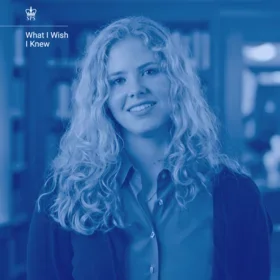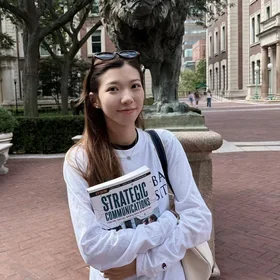Anastasi Sharp ('21SPS, M.S. in Strategic Communication) joined the School of Professional Studies in the fall of 2019. In his second semester, Anastasi was uniquely prepared to adjust to a distance learning plan when COVID-19 forced Columbia University, and SPS, to move to remote learning for the rest of the spring semester. He wrote an insightful blog post on mastering the remote work mindset, so we caught up with him to learn a little bit more about how that mindset is translating to pursuing his degree at SPS.
Anastasi is currently enrolled in the Public Relations and Corporate Communications course as part of his degree requirements (“It was online before it was mainstream!” he jokes.), where they are discussing reputation management, key publics and messaging.
“Our conversations revolve around crises organizations are facing and how they can plan before crisis strikes rather than responding reactively,” he says. “Learning about these concepts during a global crisis that affects every organization is an education in itself.”
Prior to coming to SPS, Anastasi completed a digital marketing certificate at Columbia Business School and Emeritus School of Management, where he competed against other students in his cohort in gamified digital marketing simulations. He then worked for Accessibility Modifications Solutions (an accessibility startup) in a variety of roles from campaign creation to allocating a marketing budget, where he realized the power of e-learning and how it translated to the workplace.
“I realized that distance learning teaches you transferable skills that can be applied instantly to work from home,” he said. “Distance learning not only gives you credibility in a subject area, it also teaches you how to operate remotely, which I think will be increasingly valuable for the future, but also in our current crisis.”
Here are three tricks Anastasi has learned about distance learning and how it translates to acing working from home:
- “It pays to learn about the most efficient digital tools in your industry. They will help streamline your job and allow you to do that job remotely. For example, if you are involved in content / blogging, it helps to learn about the best-in-class software out there, because it may already be implemented at your company, and if not, it could impress your supervisor if you make a strong case on why that software should be implemented.”
- “You’re rarely alone when you’re confused about how to use something. For every tool, there is a teacher, or at least, a support line. For example, Google Ads has its own customer support. LinkedIn learning is another great one.”
- “Work from home takes skill and patience, but it’s also a state of mind, requiring slightly more discipline than usual. Treat your kitchen table, home office or sofa as no less important or different than your physical office. Everything begins from there.”
We also asked Anastasi, a strategic communications student, what were some good examples of crisis communication he has seen throughout the coronavirus pandemic.
“I think of organizations that emphasized quick, frequent, and accurate communication that took a proactive position of leadership, tapping into their expertise rather than waiting for others to respond,” Anastasi says. “I think of companies like WhatsApp who took advantage of their wide reach by turning themselves into portals for up-to-date information.
“I also think of certain governments who paired communication with quick action, like proactive closures and lock downs, and set up crisis response channels with a direct line to health professionals.
Distance learning not only gives you credibility in a subject area, it also teaches you how to operate remotely, which I think will be increasingly valuable for the future, but also in our current crisis.
— Anastasi Sharp, '21SPS, M.S. in Strategic Communication
“Smaller efforts that are more about relief, escape, and e-learning like the museums that have offered virtual tours for people, or JSTOR opening up its research vault for free, are equally important, because the need for information is equally important as the need to stay calm and entertained at times like this.
“Companies and people who use their expertise to combat the crisis are also doing great work. One personal favorite that appeals to my creative side is Mo Willems, the children’s book author, who partnered with the Kennedy Center by offering drawing tutorials to entertain children who will be staying home and unable to have all the fun they are supposed to have.
“Greek tourism also ran a campaign I like called “Till Then, Stay Safe,” a simple yet clever campaign that reminds people of the beauty of Greece, tempting future travelers while responsibly reminding them to stay where they are for now.”
Anastasi says his number one goal for the future is “for us all to get through this unprecedented time.” A close second, however, is to continue what he has started at Columbia, to bridge the art and science of communication in order to advance business goals in the professional world.


